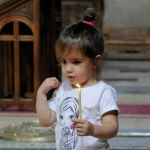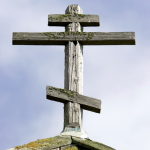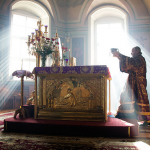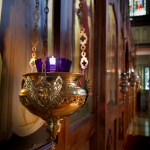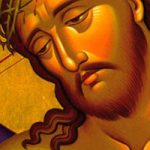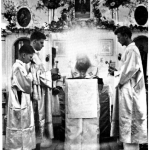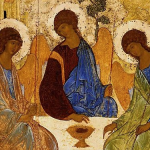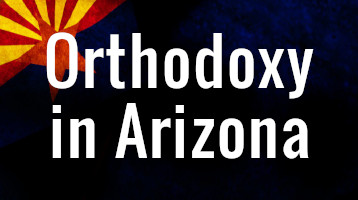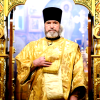Originally titled: Should Protestants Make the Sign of the Cross? A Response to Pastor Doug Wilson by Robert Arakaki In a 30 December 2012 podcast, Pastor Doug Wilson was asked what he thought about Protestants crossing themselves. Apparently, this question was asked because growing numbers of Protestants have started crossing themselves. In short, Pastor Wilson’s answer was: “It’s lawful, but it’s not appropriate at all.” He elaborated that it would not be appropriate because it could cause confusion, that is, a Protestant making the sign of the cross might be mistaken for a Roman Catholic. In this blog posting I will be discussing: (1) the origins of this practice, (2) why many … [Read more...]
The Antichrist, the Cross and the Third Sunday in Lent
The Cross is our salvation. No one was ever reconciled with God except by the power of the Cross. by St. Gregory Palamas The Cross of Christ was mysteriously proclaimed in advance and foreshadowed from generations of old and no one was ever reconciled with God except by the power of the Cross. After our First Parents transgressed against God through the tree in paradise, sin came to life, but we died, submitting, even before physical death, to the death of the soul, its separation from God. After the transgression we lived in sin and according to the flesh. Sin “is not subject to the law of God, neither indeed can be. So then they that are in the flesh cannot please God” (Romans … [Read more...]
The Church is Liturgy
On the Sunday of St. Gregory Palamas by Priest Ioannis Fortomas Brethren, today we celebrate a great Father of our Church and champion of Orthodoxy: Gregory Archbishop of Thessaloniki, the Palamas. His memorial is ordained by the Holy Church on the second Sunday of the Fast to indicate that, in St. Gregory, the Triumph of Orthodoxy over heresies (which we celebrated last Sunday) continues. St. Gregory did not introduce new doctrines to Orthodox theology; he simply mounted a defense of the treasured, mature, dogmatic tradition. Not everything that is ancient is venerable or honorable—indeed, many heresies are ancient. We must discern the Truth in all things. The Truth is eternal … [Read more...]
Watchfulness for Those in the World
Originally entitled, “A Rule of Self-Attentiveness For Those in the World” by St. Ignatius Brianchaninov The soul of all exercises in the Lord is attention. Without attention, all these exercises are fruitless and dead. He who desires to be saved should arrange things in such a way that he can safeguard self-attentiveness not only in seclusion, but also among the very scatteredness into which he is sometimes drawn against his will. On the scales of the heart, let the fear of God prevail over all other feelings: then it will be easy to safeguard self-attentiveness, both in the silence of one’s cell and amid the noise surrounding one on all sides. Prudent moderation in food, by reducing … [Read more...]
Preparation for Great Lent
by S. V. Bulgakov The preparation for Great Lent begins soon after the feast of the Theophany of the Lord corresponding to its historical commemoration that soon after His baptism Jesus Christ left for the desert for a fast, in commemoration of which the Holy Forty Day Fast was established. Beginning with the Sunday of the Publican and the Pharisee, the preparation for Great Lent comes to an end with Cheesefare Sunday. The Holy Church for a long time begins to prepare the faithful for Great Lent as a redemptive time for an all general spiritual cleansing and sanctification. This cleansing and sanctification are possible only under the condition of the complete remission of sins, the … [Read more...]
Before the Fast
by St. John of Shanghai The doors of repentance are opening, Great Lent is beginning. It is repeated every year, and each time it brings us great benefit if we spend it the right way. Great Lent is preparation for the future life, while in the shorter term it is preparation for the Bright Resurrection. Just as in a tall building the staircase is constructed in a way that makes it easier to ascend to the building’s heights, so are various days of the year steps for our spiritual upliftment and ascent. The days of Great Lent and Holy Pascha are just such days. By Great Lent we are cleansed of sinful defilement, and on Holy Pascha we feel the blessedness of the coming of Christ’s Kingdom. … [Read more...]
The Filioque in Brief
by John Nichiporuk We were recently asked the following question: “Why is it so wrong to say that the Spirit also proceeds from the Son, if He indeed is co-eternal with the Father? Understanding the complexity of this issue, causing argument for more than a thousand years, we will try to give a short answer to it, with no pretension to providing a complete coverage of this theological problem. Testimony of the Holy Scripture First of all, indeed, both Catholics and the Orthodox confess the co-eternity of the Holy Spirit and the Son with the Father, as well as Their consubstantiality and Their complete ontological equality. However, returning to the question posed, the co-eternity of … [Read more...]
A Pagan Records the Slaughter of the Holy Innocents
Matthew says that when Herod realized the magi were not going to return, he ordered the slaughter of all male children two years old and under in Bethlehem and the neighboring towns (Matt. 2:16-18). Although Mark and Luke do not mention the Slaughter of the Innocents, John alludes to it in the Apocalypse (Rev. 12:1-4), and thus becomes a witness to the verity of the Matthew’s record. The witness of Matthew and John is also corroborated by a pagan writer named Macrobius. Macrobius wrote an encyclopedic account of Roman culture entitled the Saturnalia, in which he records the legends and lore of the holidays marking the Roman calendar. In book two, Macrobius records some of the witty … [Read more...]
The Sacrifice of Thanksgiving
“He who offers a sacrifice of thanksgiving honors Me; And to him who orders his way aright I shall show the salvation of God.” - Psalm 49:23 (LXX) Next year is the 400th anniversary of the celebrating Thanksgiving to God for the mercy, love, and bounties he pours out on us. The giving of thanks is the central act of Christian worship, and it is an integral feature of Old Testament worship, which are types of Christian worship. There are many instructions for sacrifice throughout the Pentateuch, but Leviticus chapters 1-7 is completely dedicated to the 5 Levitical offerings which were the main sacrifices used in the rituals. The 5 kinds of sacrifices described in such detail in Leviticus … [Read more...]
What Happens to Those Who Have Never Heard of Jesus?
What happens to those who have never heard of Jesus? Will God condemn people to hell for not believing in someone they have never heard of? First, people are not condemned to hell for not believing in Jesus whom they have never heard of. Rather they are already condemned because of their sin. Thus, the real question is not how can God send someone to hell, but how can God condescend to save any one of us? As Paul has so beautifully written in the book of Romans, "God shows his love for us in that while we were yet sinners Christ died for us. Since, therefore, we are now justified by his blood, much more shall we be saved by him from the wrath of God." (Romans 5:8-9). If ignorance were … [Read more...]
- « Previous Page
- 1
- …
- 5
- 6
- 7
- 8
- 9
- 10
- Next Page »
